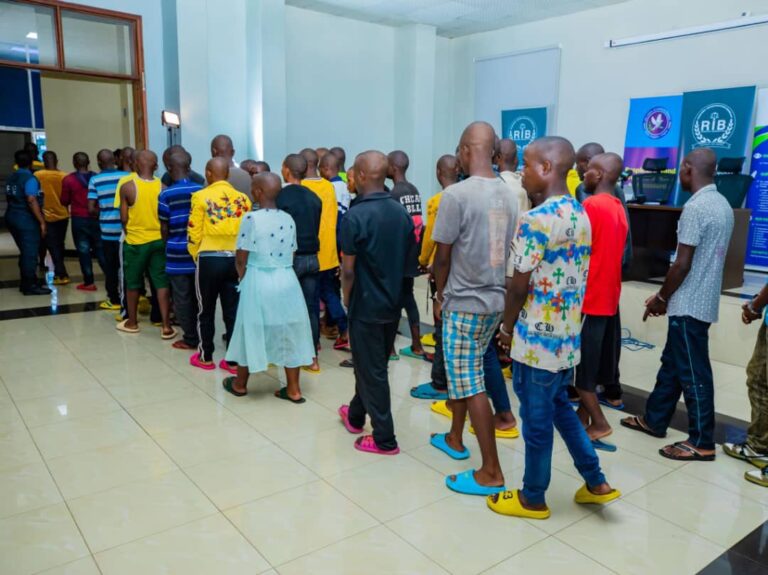
Joint operations by Rwanda National Police (RNP), Rwanda Investigation Bureau (RIB) and Rwanda Utility Regulatory Authority (RURA) led to the arrest of 45 members of the same ring suspected of scamming and stealing money from people’s mobile banking accounts. They were paraded to the media on Monday, September 9, at RIB headquarters in Kimihurura, Gasabo District.
The racket includes mobile money agents, who were helping scammers to withdraw money sent by victims. The majority of the suspects were arrested in the sectors of Nyakarenzo and Nkungu in Rusizi District. According to RIB, the ring defrauded different people of over Frw424 million between January and July, this year.
Scam methods
The ring was using different tricks to lure and defraud unsuspecting people. The methods include calling or sending short messages to their targets that you have won a jackpot, their child got an accident that requires money to pay for urgent medical bills; scammers guising as employees of telecommunication companies telling their unwitting targets that their SIM card has been selected for a big reward and in the process requires you to send a specific amount of money for the service.
There are those who fall prey to the idea that their mobile banking accounts have been hacked or experiencing some technical issues. Scammers will request you to enter a certain code where you end up either wiring your money to someone you don’t know or changing your PIN, thus giving control of your mobile banking account to the scammer.
Others masquerade as Police officers working in the department of Testing and Licensing, targeting especially those who have failed a driving test.
The RNP spokesperson, Assistant Commissioner of Police (ACP) Boniface Rutikanga, said that the Police has been receiving complaints from victims and the vigilant members of the public about people calling themselves traffic Police officers asking for money to help them with driving tests.
“Police expects you to go through due process to register again, if you fail a driving test. Anyone telling you that they will help you, in any way…they are trying to defraud you. There are victims, including those who do not report because they are ashamed of being duped in such easy means or fear because what they did also amounts to bribery,” ACP Rutikanga said.
He urged the public to always be cautious and report people calling them asking for money or benefits for any service, to facilitate law enforcement to break such scam networks.
The RIB spokesperson, Dr. Thierry Murangira said that the racket faces five accounts; formation of or joining a criminal association, fraud, claiming to be attached to a profession, a certificate, an official diploma or any other entitlement granted to a person meeting requirements; illicit enrichment and money laundering. The sentence ranges between two to ten years imprisonment.
“Unearthing their tricks, members and where they live required time and concerted efforts from different institutions and the public. These are people, who seat in a certain place and hatch plans with every member of the racket playing different roles. The same efforts are still on the ground searching for other people engaged in these criminal practices,” Murangira said.
Charles Gahungu, the General Manager for ICT Regulation Department at RURA, said that the regulatory body has taken stringent measures to control SIM card registration, one of the processes through which fraudsters acquire them.
“We found out that people vending SIM cards, including agents, were registering different SIM cards on one client that came to buy just one SIM card. These are the same SIM cards that are being used by scammers and that is one of the challenges that the new guidelines will address,” Gahungu said.
Currently, SIM card registration is done at service centers of any of the mobile network operators, upon presenting an Identity card.
“We urge the public to check the numbers registered under your name and deregister those they are not aware of or those they no longer use. Be cautious because one of these unknown lines under your names or those you lost could be in the hands of the wrong people, and you will be the first suspect if your SIM card is identified to be used in scamming people,” Gahungu said.
He also cautioned people who share SIM cards. “A SIM card is a very sensitive personal property that should be protected. Today, your SIM card is your bank and your access to very many essential services, and if you do not protect it or your PIN, it will fall in the hands of the wrong people. So, you will be hurting yourself because of your negligence.” (End)
